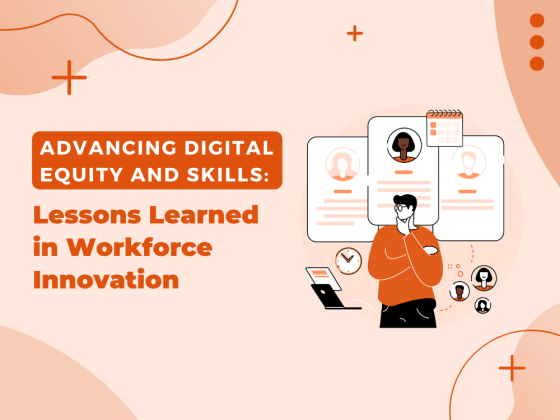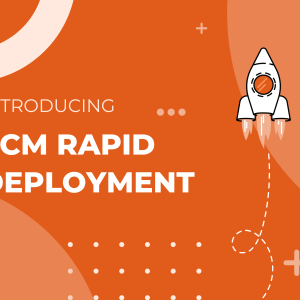Advancing Digital Equity and Skills: Lessons Learned in Workforce Innovation
Whether it’s a natural disaster or a global pandemic, one thing has become crystal clear over the last few years — businesses thrive when they are able to hire skilled workers and have access to policies that facilitate upskilling in a rapidly transforming environment. Workers, on the other hand, thrive when they have access to timely and accessible upskilling opportunities, including those that allow them to build digital literacy skills in an equitable fashion. But here’s today’s reality: 31% of workers lack digital skills and only 35% have achieved baseline proficiency according to an OECD Survey of Adult Skills. While the plurality of workers with digital skills gaps are white, digital equity issues do disproportionately burden workers of color.
The negative effects of structural racism in education and workforce development are well documented, as is their spillover into the areas of access to digital technology and opportunities for digital skill building. Understanding and keeping this disparity in mind can help ensure that workers of any background have an equal chance to upskill and advance in their careers. As an example, people of color are more likely to lack broadband internet access at home, more likely to lack a desktop or laptop computer at home, and otherwise face greater difficulties obtaining the technology most often used to build digital literacy skills. That same OECD survey found that black workers are 12% of all workers, but 15% of those have no digital skills and 21% of those have only limited skills. Latino workers are 14% of all workers, but 35% have no digital skills, and 20% have limited skills.
So what can be done? It’s important to embed digital literacy skills within existing workforce development and education programs at every touch point. Organizations should invest in digital skills building, even with so many competing needs. Let’s face it, the future is here and it is digital. If this is prioritized, traditionally underserved communities are more likely to have equitable access to employment. It’s vital that new grants support the development and implementation of programs that embed digital literacy skills as part of broader occupational skills training, integrated education and training, and other accelerated learning strategies. We need not look far to see leading change makers already implementing digital skills into every fiber of their work.
Meet LISC
Local Initiatives Support Corporation (LISC), a long-time Exponent Case Management client, works to connect hard-to-access public and private resources with underinvested people working to gain access to opportunities we all deserve.
LISC’s financial stability initiatives include a national network of 100 Financial Opportunity Centers® that help to support access to career pathways, digital literacy, financial counseling, and access to financial products and benefits. The goal of these services is to provide financial and employment stability by helping clients to build credit, savings and assets. In 2020, LISC received funding to build out and implement more robust digital skills development into their service offerings. There were a number of workforce development partners already deploying financial literacy services through workshops and one to one interactions, however, they were not being closely tracked. LISC needed to readily assess which digital literacy skills were being developed and correlate that with improved outcomes. So LISC sought to redefine how they track these services and enhance their current system in order to do so.
Challenges the Fostered Innovation
Yet some challenges and opportunities arose through an examination of their current state of affairs. It became clear that even though LISC had been providing digital literacy services for some time, they did not have the data infrastructure in place to properly track and measure the progress being made from these offerings. To further complicate things, this was in the peak of the COVID 19 pandemic, so adult learners and participants in the FOCs needed to access testing and training remotely due to limited staffing. Most did not even have the equipment at home that they needed in order to access these services and learn new skills. With the new funding they immediately deployed an innovative approach with 6 FOCs in priority markets or areas with the most need. With that funding they also expanded their lending library so that participants could access the hardware and software they needed on a temporary basis until the training was complete and they could purchase their own.
A Holistic Approach to Tracking Digital Literacy
When LISC was considering how to track that data more effectively, they considered using pre and post assessments to track progress after services had been delivered. It’s important to note that LISC is not the end user of Exponent Case Management, but rather the 100 FOCs that are providing services and entering data into the system. However, because of the range of providers and topics covered, it was difficult to capture all types of services under one assessment type. After many conversations, LISC decided to expand tracking on employment counseling service entries with Exponent Case Management, both for group classes and one-to-one interactions, and digital literacy skills gained with exams that were passed with a score of over 80%. In addition to existing employment counseling, financial coaching, access to income supports and workplace supports (i.e. transportation), they added a fifth service entry type dedicated to digital literacy. LISC also added a yes or no question about digital literacy training to the other service entry types as many of the other services did include it in some form or fashion. For example, a coach providing a lesson on creating or updating a resume may also spend time helping the participant to navigate Microsoft Word. Financial coaching may include showing a participant how to use LISC’s financial products or apps. Here is a quick idea of how they conceptualized tracking digital literacy skills development:
“Exponent Case Management’s native functionality was a great fit to track digital skills training,” notes Carolina Rendon, Senior Program Officer at LISC.
Once these new fields and service types were implemented, LISC was able to easily report whether digital literacy skills building across various services led to job placement, increased income, and promotions by combining ECM with a holistic approach to tracking this data across multiple touchpoints.
“As of last month [June of 2021] we have had 3000 clients receive digital literacy skills as opposed to 600 in all of last year. Through the enhanced tracking of data, we have been able to assess the impact of digital skills,” Carolina shared during an ECM user group meeting in June 2021.
Funding for Digital Literacy – Digital Equity Act
The challenge of building these skills does not fall to workforce organizations alone, policymakers have started to invest in digital literacy as well. In 2021, congress passed Digital Equity Act which includes $2.75 Billion in funding for digital skills training and education for low-income populations, improved online accessibility of social services for folks with disabilities, and it gives communities the power to measure and address their own broadband needs. They aim to ensure that all people and communities have the skills, technology, and capacity needed to reap the full benefits of the digital economy. The three programs are administered by the Telecommunications and Information Administration(NTIA) and include:
- State Digital Equity Planning Grant Program: A $60 million grant program for states and territories to develop digital equity plans.
- State Digital Equity Capacity Grant Program: A $1.44 billion grant program for states and territories. It will fund an annual grant program for five years in support of digital equity projects and the implementation of digital equity plans.
- Digital Equity Competitive Grant Program: A $1.25 billion grant program. It will fund annual grant programs for five years to implement digital equity projects.
The Telecommunications and Information Administration (NTIA) has not announced a specific timeline for organizations to apply for these grants but if you want to know more about who is eligible, how to apply and access resources, check out this fact sheet from the National Skills Coalition.
A System and Partner for a Sustainable Future
For workforce organizations who want to start tracking their digital literacy services, we can help. We understand that you need a partner that understands the workforce development and human services space, has solved similar challenges, has walked in your shoes and has experienced the issues you face when it comes to creating an equitable future for all workers. Here at Exponent Partners, the makers behind the most advanced human services platform available on the market today — Exponent Case Management, we’re equipped to do just that. We’re a team of expert strategists, developers, product managers and implementation specialists on a mission to make nonprofits radically better at driving social impact. Because our team understands your organization, processes, and people in great detail, we’re already fully invested in you and can help you to take advantage of this new funding. Let us be there to guide you along the way. Contact us for a consultation today!




